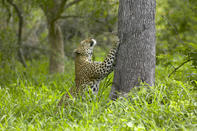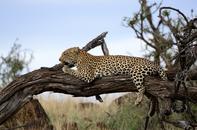Urine Scenting
Leopards have excellent senses and they use a combination of these to locate prey. These are also employed in the exchange information between territory-holders and possible intruders.

Both male and female leopards use urine to demarcate their territorial boundaries, only males spray. The scent of the urine, as well as its strength, carry messages such as the identity of the territory holder, the general time when it was last in the vicinity and hormone levels of females.
Male leopards scrape the ground after or during urination to transfer scent onto their feet to be left behind during patrols. The scrape marks are also visual beacons to intruders. They defecate in conspicuous places along territorial boundaries to ward off intruders.
Leopards go to great lengths to advertise their territories to avoid physical confrontations with one another. As solitary hunters, they can not risk injury by engaging unnecessarily with another leopard. Male leopards engage in deliberate patrols to reinforce their territorial limits while females mark less concentrating on finding food and only marking along active boundaries.
Claw Marks
Another form of visual territorial beacon is the clawed scrape marks left on the trunk of trees along pathways. Leopards claw hard surfaces such as the bark of trees to maintain their claws.
The friction removes bits of fraying claw-sheath. The resultant marks are often high up the trunk, the leopard rises up on its hind legs to claw the tree with its forepaws, and these are possibly to show off their size to would-be trespassers.
Leopards also rub their faces against low overhanging vegetation along roads or other pathways and territory boundaries. In doing so they transfer secretions from their cheek glands, which also carry olfactory messages.
Leopard Rest Spots

Leopards generally spend the hottest hours of the day resting to conserve the energy needed to execute kills and defend territories. They usually rest in the thick cover of a wooded drainage line or a leafy tree. Sometimes they may retreat into a cave.
Leopards regularly make use of rocky outcrops as den sites, vantage points or to sun themselves during cold weather.
Leopards often roll in the dung of other animals. It is not certain what the reason is for this but it has been suggested that the smell of the dung may mask the leopard’s own scent during hunts or possibly even transfer the leopard’s own scent onto the dung as a territorial act.
By Megan Emmett